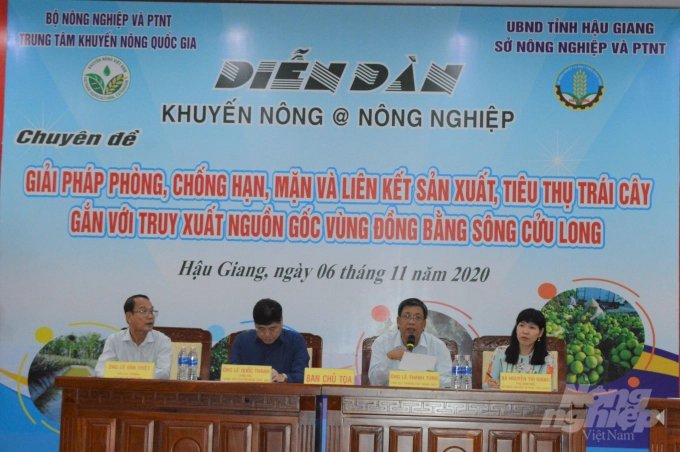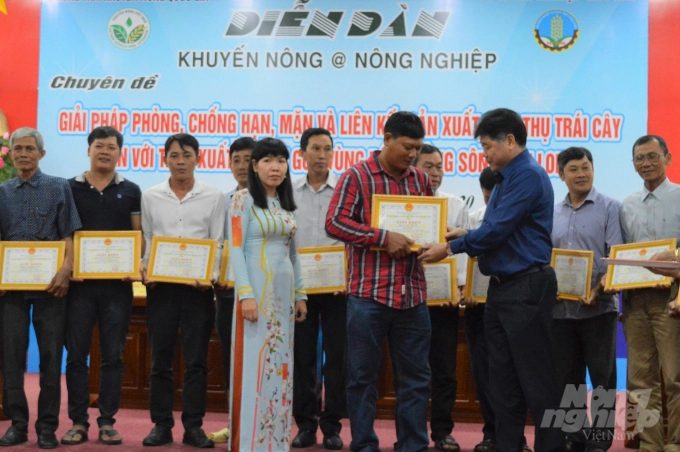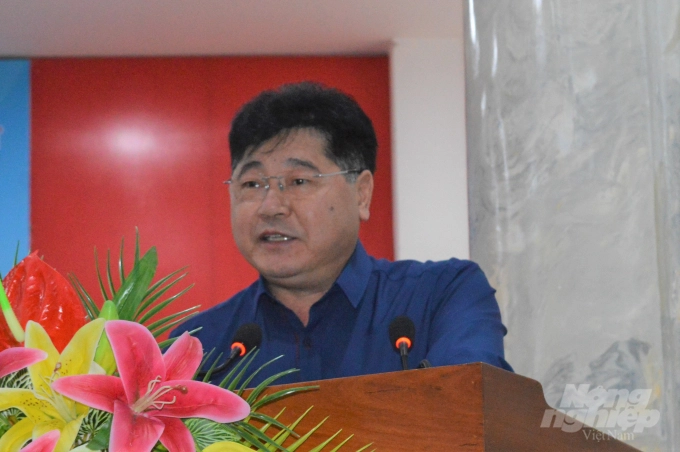May 20, 2025 | 05:56 GMT +7
May 20, 2025 | 05:56 GMT +7
Hotline: 0913.378.918
May 20, 2025 | 05:56 GMT +7
Hotline: 0913.378.918

A view of the forum "Solutions to prevent drought and salinity, and link fruit production and consumption associated with traceability in the Mekong Delta”. Photo: Trung Chanh.
Solutions to protect fruit orchards against the adverse weather and to have traceable fruit products in the Mekong Delta will enhance fruit export in the region and in Vietnam.
The solutions were mentioned among agriculture experts, scientists and businesses gathering at the forum held by the National Agricultural Promotion Centre on November 6 in Vi Thanh City, Hau Giang Province.
Nguyen Thi Giang, deputy director of the Hau Giang Province’s Agriculture and Rural Development Department said: “About 15 percent of 42,000 hectares orchard in the province has been grown under GAP standards.”
She added: “The rest area of the orchard is grown with safe solutions.”
However, Giang said as local farmers still had a short-term production, leading to the problem of "planting then cutting" in many types of fruits. There were also many difficulties from the lack of linkage between production and consumption.
At the same time, drought and saline intrusion have caused many difficulties and heavy losses for the local farmers, she said, mentioning the worst crop when 11 out of 13 provinces and cities in the Mekong Delta were seriously affected by the drought including five provinces declaring their emergency state from natural disasters between 2015 and 2016.

Mr. Le Quoc Thanh, director of the National Agricultural Extension Center (in navy shirt) awards certificates of merit to winners of the contest for safe and delicious fruit growers in 2020. Photo: Trung Chanh
While the dry season of 2019-2020 affected more than 21,000 ha of the orchard in the region, Giang forecast the dry season 2020-2021 will continue to suffer from complicated weather conditions due to drought coming sooner and saline developments in the region.
According to the Southern Institute of Water Resources Research, drought and saline intrusion will occur from mid-February or early March and last until around May 2021.
Dealing with droughts, deputy president of the Southern Fruit Research Institute Dr. Vo Huu Thoai said: “Solutions for orchards against drought include bigger ditches to store water, avoid flowering and fruit harvesting in the dry season, ending the crops before the drought and salinity intrusion, using some salt-resistant plantations.”
At the forum, Le Van Thiet, deputy head of the Plant Protection Department said: “Protecting crops, opening markets and issuing area codes are the three must-do actions now,”
Thiet said the world import value of vegetables and fruits was US$680 billion in 2018 including $270 billion from fresh fruit export while Vietnamese exports of vegetables and fruits in the same period only accounted for only 1.4 percent of the world's total imports.
He said as the demand was forecasted to be constantly increasing and accounts for a higher proportion in the total agricultural trade turnover, adding: “There is a huge potential export market for Vietnamese fruits.”
Thiet said: “We have an open market after joining WTO, but fruit exporters must meet two standards of certification of phytosanitary and food hygiene and safety as well as some separate regulations due to each market, especially the difficult ones.”
He detailed: “To be assigned a planting area code, the minimum production area must be of at least 10 hectares, located by an electronic map and applied advanced process.”
According to Le Quoc Thanh, director of the National Agricultural Promotion Centre, the whole country currently has more than 1 million hectares of fruit orchard including 261,000 hectares in the Mekong Delta whose output is about 3.5 million tonnes per year. Popular fruits include mango, longan, banana, pomelo, oranges, durian, dragon fruit, pineapple and rambutan.

Associate Professor, Ph.D. Le Quoc Thanh, Director of the National Agricultural Promotion Center, delivers an opening speech at the forum. Photo: Trung Chanh.
He said Vietnam exported to 85 countries and territories, becoming a hub of fruit and vegetable export, ranking 7th in the world in 2018 with an export turnover of $3.8 billion. In 2019, the local vegetable and fruit export reached $3.7 billion with a trade surplus of nearly $2 billion.
Thanh considered that the fruit production in the Mekong Delta has a key role in terms of output and value in Vietnam, however, climate change and extreme weather with frequent droughts and saltwater intrusion in recent years have greatly affected the production in the region.
As the fruit plantation in the region was still scattered and small, it was difficult for effective investment in infrastructure, production, and a quality control system meanwhile the development associated with traceability in the region was still limited, said Thanh, urging to change the issues.
Author: Trung Chanh. Translated by Do Do. Edited by Duc Huy.

(VAN) As a doctoral student doing research on renewable energy and electrification at Harvard University, the author shares his musings on electricity, nature, and countryside memories.

(VAN) The decree on Extended Producer Responsibility (EPR) ensures transparent management and disbursement of support funds, avoiding the creation of a “give-and-take” mechanism.

(VAN) Hue City rigorously enforces regulations regarding marine fishing and resource exploitation, with a particular emphasis on the monitoring of fishing vessels to prevent illegal, unreported, and unregulated (IUU) fishing.

(VAN) Hanoi People's Committee has issued a plan on reducing greenhouse gas emissions in the waste management sector with 2030 vision.

(VAN) Vietnam's draft amendment to Decree No. 156 proposes a mechanism for medicinal herb farming under forest canopies, linking economic development to population retention and the sustainable protection and development of forests.

(VAN) In reality, many craft village models combined with tourism in Son La have proven effective, bringing significant economic benefits to rural communities.

(VAN) The international conference titled Carbon Market: International experiences and recommendations for Vietnam was successfully held recently in Ho Chi Minh City.